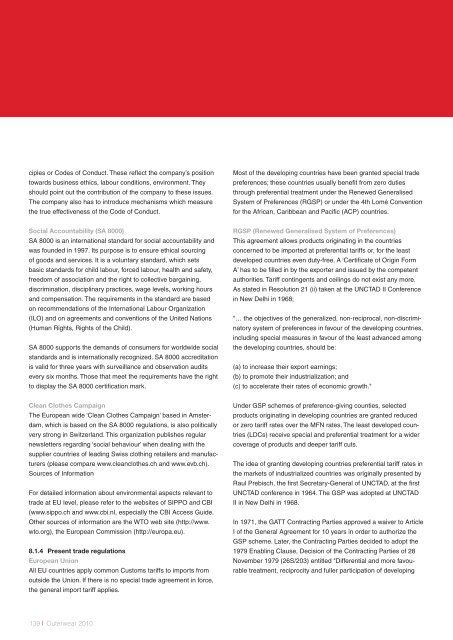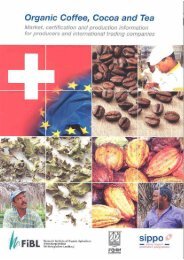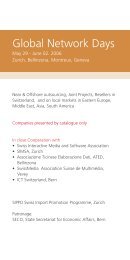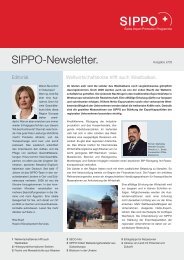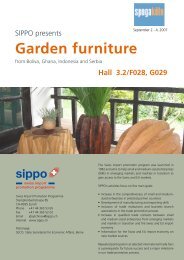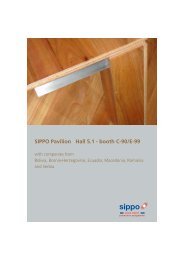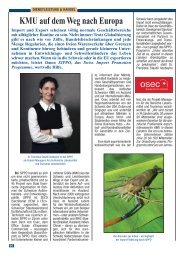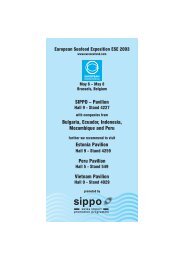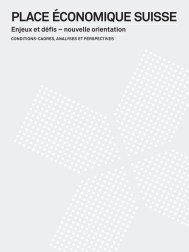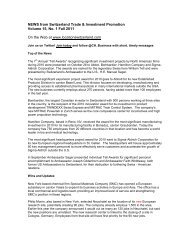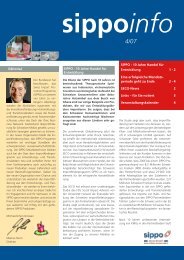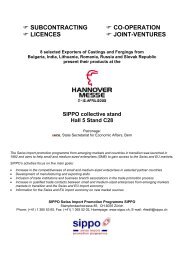Outerwear. - Business Location Switzerland
Outerwear. - Business Location Switzerland
Outerwear. - Business Location Switzerland
You also want an ePaper? Increase the reach of your titles
YUMPU automatically turns print PDFs into web optimized ePapers that Google loves.
ciples or Codes of Conduct. These reflect the company’s position<br />
towards business ethics, labour conditions, environment. They<br />
should point out the contribution of the company to these issues.<br />
The company also has to introduce mechanisms which measure<br />
the true effectiveness of the Code of Conduct.<br />
Social Accountability (SA 8000)<br />
SA 8000 is an international standard for social accountability and<br />
was founded in 1997. Its purpose is to ensure ethical sourcing<br />
of goods and services. It is a voluntary standard, which sets<br />
basic standards for child labour, forced labour, health and safety,<br />
freedom of association and the right to collective bargaining,<br />
discrimination, disciplinary practices, wage levels, working hours<br />
and compensation. The requirements in the standard are based<br />
on recommendations of the International Labour Organization<br />
(ILO) and on agreements and conventions of the United Nations<br />
(Human Rights, Rights of the Child).<br />
SA 8000 supports the demands of consumers for worldwide social<br />
standards and is internationally recognized. SA 8000 accreditation<br />
is valid for three years with surveillance and observation audits<br />
every six months. Those that meet the requirements have the right<br />
to display the SA 8000 certification mark.<br />
Clean Clothes Campaign<br />
The European wide ‘Clean Clothes Campaign’ based in Amsterdam,<br />
which is based on the SA 8000 regulations, is also politically<br />
very strong in <strong>Switzerland</strong>. This organization publishes regular<br />
newsletters regarding ‘social behaviour’ when dealing with the<br />
supplier countries of leading Swiss clothing retailers and manufacturers<br />
(please compare www.cleanclothes.ch and www.evb.ch).<br />
Sources of Information<br />
For detailed information about environmental aspects relevant to<br />
trade at EU level, please refer to the websites of SIPPO and CBI<br />
(www.sippo.ch and www.cbi.nl, especially the CBI Access Guide.<br />
Other sources of information are the WTO web site (http://www.<br />
wto.org), the European Commission (http://europa.eu).<br />
8.1.4 Present trade regulations<br />
European Union<br />
All EU countries apply common Customs tariffs to imports from<br />
outside the Union. If there is no special trade agreement in force,<br />
the general import tariff applies.<br />
139 l <strong>Outerwear</strong> 2010<br />
Most of the developing countries have been granted special trade<br />
preferences; these countries usually benefit from zero duties<br />
through preferential treatment under the Renewed Generalised<br />
System of Preferences (RGSP) or under the 4th Lomé Convention<br />
for the African, Caribbean and Pacific (ACP) countries.<br />
RGSP (Renewed Generalised System of Preferences)<br />
This agreement allows products originating in the countries<br />
concerned to be imported at preferential tariffs or, for the least<br />
developed countries even duty-free. A ‘Certificate of Origin Form<br />
A’ has to be filled in by the exporter and issued by the competent<br />
authorities. Tariff contingents and ceilings do not exist any more.<br />
As stated in Resolution 21 (ii) taken at the UNCTAD II Conference<br />
in New Delhi in 1968;<br />
"… the objectives of the generalized, non-reciprocal, non-discriminatory<br />
system of preferences in favour of the developing countries,<br />
including special measures in favour of the least advanced among<br />
the developing countries, should be:<br />
(a) to increase their export earnings;<br />
(b) to promote their industrialization; and<br />
(c) to accelerate their rates of economic growth."<br />
Under GSP schemes of preference-giving counties, selected<br />
products originating in developing countries are granted reduced<br />
or zero tariff rates over the MFN rates. The least developed countries<br />
(LDCs) receive special and preferential treatment for a wider<br />
coverage of products and deeper tariff cuts.<br />
The idea of granting developing countries preferential tariff rates in<br />
the markets of industrialized countries was originally presented by<br />
Raul Prebisch, the first Secretary-General of UNCTAD, at the first<br />
UNCTAD conference in 1964. The GSP was adopted at UNCTAD<br />
II in New Delhi in 1968.<br />
In 1971, the GATT Contracting Parties approved a waiver to Article<br />
I of the General Agreement for 10 years in order to authorize the<br />
GSP scheme. Later, the Contracting Parties decided to adopt the<br />
1979 Enabling Clause, Decision of the Contracting Parties of 28<br />
November 1979 (26S/203) entitled "Differential and more favourable<br />
treatment, reciprocity and fuller participation of developing


